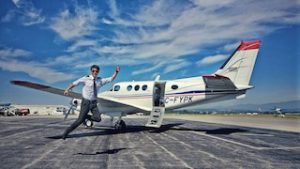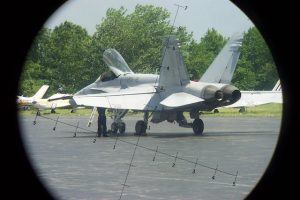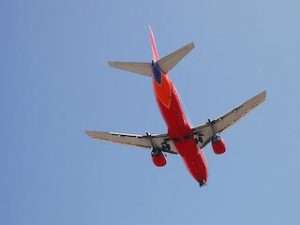How To Get A Job As A Computer Programmer In The Airline Industry
 A computer programmer can support digital systems in airline operations. These systems include ticketing, fleet tracking, and maintenance platforms. Many airlines seek skilled programmers for smooth systems. With the right steps, entering this field becomes easier. Understanding how airline systems work helps programmers position themselves for such opportunities.
A computer programmer can support digital systems in airline operations. These systems include ticketing, fleet tracking, and maintenance platforms. Many airlines seek skilled programmers for smooth systems. With the right steps, entering this field becomes easier. Understanding how airline systems work helps programmers position themselves for such opportunities.
Computer programmer should learn the industry
Airlines rely on languages like Java, Python, and C++. Learning these can help a computer programmer prepare for programming in aviation systems. Java supports ticketing and booking systems. Python connects with data science in flight operations. C++ helps with embedded systems in aircraft software. Each language adds a useful skill for airline tasks.
Building a strong foundation in airline software tools
Airline companies use software tools such as Sabre, Amadeus, and Navitaire. These platforms help manage reservations and flights. Learning how these tools work helps programmers adapt fast. Many systems use APIs and web services. Understanding these tools improves a programmer’s value to the airline.
Focusing on real-time data handling
Airlines manage large volumes of real-time data. Programmers must write efficient code that runs with speed and accuracy. Live data includes flight paths, weather, and crew schedules. Writing programs that adapt to real-time events supports airline safety and timing. Fast data handling improves airline performance.
Understanding aviation security requirements
Aviation systems need secure code to protect passengers and data. Programmers must learn cybersecurity best practices. Writing safe code prevents system hacks or crashes. Airlines depend on secure programs to protect bookings and operations. Programmers who focus on safety will be trusted more.
Using project experience to show skills
Building project experience in aviation adds weight to applications. Working on simulations, mobile booking apps, or flight dashboards helps. Each project should show clean code and real-time function. Projects also help during interviews. Recruiters like real proof of programming skills.
Learning database management for airline applications
Airlines store large data in systems such as SQL Server, PostgreSQL, and Oracle. Programmers must handle complex queries with speed. Database knowledge improves back-end system performance. Managing airline records needs careful design and fast response. Programmers with strong database skills stand out.
Joining online platforms to learn from others
Online forums and courses help programmers connect with airline experts. Platforms like GitHub and Stack Overflow provide feedback. These connections support fast learning. Sharing airline-themed projects also builds visibility. Visibility helps attract airline recruiters to your profile.
Practicing clean code with aviation themes
Writing clean code supports fast updates and teamwork. Airlines need systems that change quickly during emergencies. Practicing clean code using flight or airport data makes a resume stronger. Recruiters notice neat, readable code. Clean programs reduce bugs in airline systems.
Studying airline system structures
Understanding the parts of airline systems helps match code to needs. These include booking engines, inventory systems, and crew scheduling. Each system depends on code logic and strong database links. Programmers must map systems clearly to ensure everything connects smoothly.
Searching for airline tech internships
Airline internships in tech departments provide real experience. Many airlines offer student programs each year. These teach aviation processes and system handling. Internships create long-term job chances. Even short projects help build strong resumes.
Adding cloud computing to your skillset
Many airlines now use cloud systems for storage and service delivery. Programmers must learn platforms like AWS and Azure. Cloud tools help build airline apps with global access. Knowing cloud basics improves your programming match for airline software projects.
Applying to jobs through airline career portals
Most airlines post tech jobs on their own websites. Career pages show new postings daily or weekly. Programmers should check these often. Submitting resumes early helps beat competition. Always tailor the resume to match airline job descriptions.
Customising resumes for aviation jobs
Each application should match the job in language and skills. Highlight software tools used by airlines. Mention projects that use airline-style data. Use short points to show results from each project. Clear resumes help recruiters read quickly.
Networking with airline tech professionals
LinkedIn helps find people in airline tech departments. Sending polite messages builds connections. These contacts may share advice or job leads. Many airline jobs come through referrals. Networking opens hidden paths to programming jobs in aviation.
Preparing for technical interviews with airline focus
Airline interviews test coding, systems knowledge, and behavior. Practice with flight-related coding challenges. Many interviews include live problem-solving. Focus on speed, clarity, and test cases. Understanding airline priorities helps give better answers during interviews.
Improving communication and documentation skills
Programmers must write clear reports and update system manuals. Airlines rely on team communication for safety. Sharing updates clearly helps others fix problems fast. Programmers with clear writing skills work better in teams. Documentation also helps during audits.
Learning about aviation compliance standards
Airline software must follow rules such as DO-178C or FAA checks. Learning these improves programmer job readiness. These rules guide how to test and release safe code. Following them avoids errors that can delay flights. Knowledge of standards helps during job interviews.
Focusing on testing and debugging skills
Testing keeps airline systems working during pressure. Programmers must test each function and fix bugs fast. Airlines need systems that restart quickly. Debugging skills help reduce delays and improve customer trust. A programmer who tests code well gets trusted with more systems.
Contributing to open source aviation projects
Open source projects attract attention from recruiters. Contributing to aviation tools or plugins shows interest in the field. These projects also build skills. They provide real use cases and feedback. Programmers with open source work appear more prepared.
Learning DevOps tools that airlines use
Airlines use DevOps to keep updates fast and safe. Programmers should learn tools like Jenkins, Docker, and Git. These tools manage code flow and deployment. Fast updates are key in airline apps. DevOps skills add power to your programming toolkit.
Practicing API integration for airline systems
Airline systems use many APIs to share data. Programmers must know how to call and connect APIs. Booking engines, weather feeds, and flight tracking use APIs. Good integration helps systems work together. APIs save time and reduce manual tasks.
Joining aviation programming communities
Online and local communities bring together programmers in aviation. These groups share news, tools, and openings. Joining helps stay current. These contacts also lead to freelance or full-time offers. Community learning grows programming skills faster.
Building mobile apps for flight services
Airlines now offer mobile apps for bookings, alerts, and check-ins. Programmers with mobile skills are in demand. Learning Android and iOS programming helps meet airline needs. Apps must load fast and show live flight updates. Mobile app success leads to more job offers.
Studying real flight data for testing projects
Flight data is available through public APIs. Use this to test code ideas. Simulating check-ins, delays, or schedules builds skill. Testing with real data adds value to sample projects. These projects help during interviews with airline tech teams.
Choosing programming specialisations that match airline needs
Airline systems need specialists in front-end, back-end, and systems code. Choose one and grow deep knowledge. Each area supports airline operations. Focus gives better job results. Airlines need all three kinds of programmers.
Working with airlines through software vendors
Some programmers work with airline clients through vendors. These companies supply IT services to airlines. Jobs include support, maintenance, and upgrades. Working with vendors helps build airline knowledge. Later, this helps in direct airline job moves.
Attending tech conferences with airline sessions
Some conferences feature airline tech speakers. Attend these to learn about current challenges. Conferences also build contacts. Recruiters may also attend. Learning from speakers helps align your projects with real airline needs.
Preparing for time-sensitive programming tasks
Airlines face pressure during delays or system failures. Programmers must fix issues fast. Practice writing quick patches that still work well. Fast solutions keep flights on track. Speed matters in airline code environments.
Learning airline scheduling and operations logic
Understanding how flights, crews, and planes are scheduled helps in system design. Programmers support these processes with smart tools. Studying operations gives ideas for new apps. These tools help airlines stay on time.
Offering freelance airline software services
Some airlines seek freelance developers for app updates or plugins. Building a freelance profile shows skill. Freelance work also adds to experience. Airline freelance jobs can lead to full-time openings.
Getting certifications that match airline systems
Certificates in Java, Python, or aviation tools improve job chances. Airlines notice certified programmers. These papers show training in useful topics. Add certifications to your resume page. They support your application.
Maintaining focus on quality and team fit
Airline programming needs teamwork and high standards. Show you write stable code and work well with others. Managers look for team fit. Good programmers care about system safety and user ease. Show both in your application.
Building a personal website with airline projects
A website helps recruiters find you. Post your airline projects and code samples. Write short posts about what you learned. This adds proof of your interest in aviation. Websites improve trust and show passion.
Reading airline tech blogs and company pages
Many airlines post tech news on blogs. Reading them shows what tools they use. Follow their updates to prepare better. These blogs often announce new job types. Knowing what they need helps in interviews.
Staying positive and consistent during the search
Tech job searches may take time. Keep learning and applying. Update your resume often. Improve your code. Stay active on forums. Each step adds progress. Airlines hire those who keep going.
Programming your way into aviation
Becoming a computer programmer in the airline industry takes patience, skill, and direction. The path grows stronger with each project, each certification, and each connection. With steady effort and smart learning, a job with an airline becomes a reachable goal for any skilled programmer.









